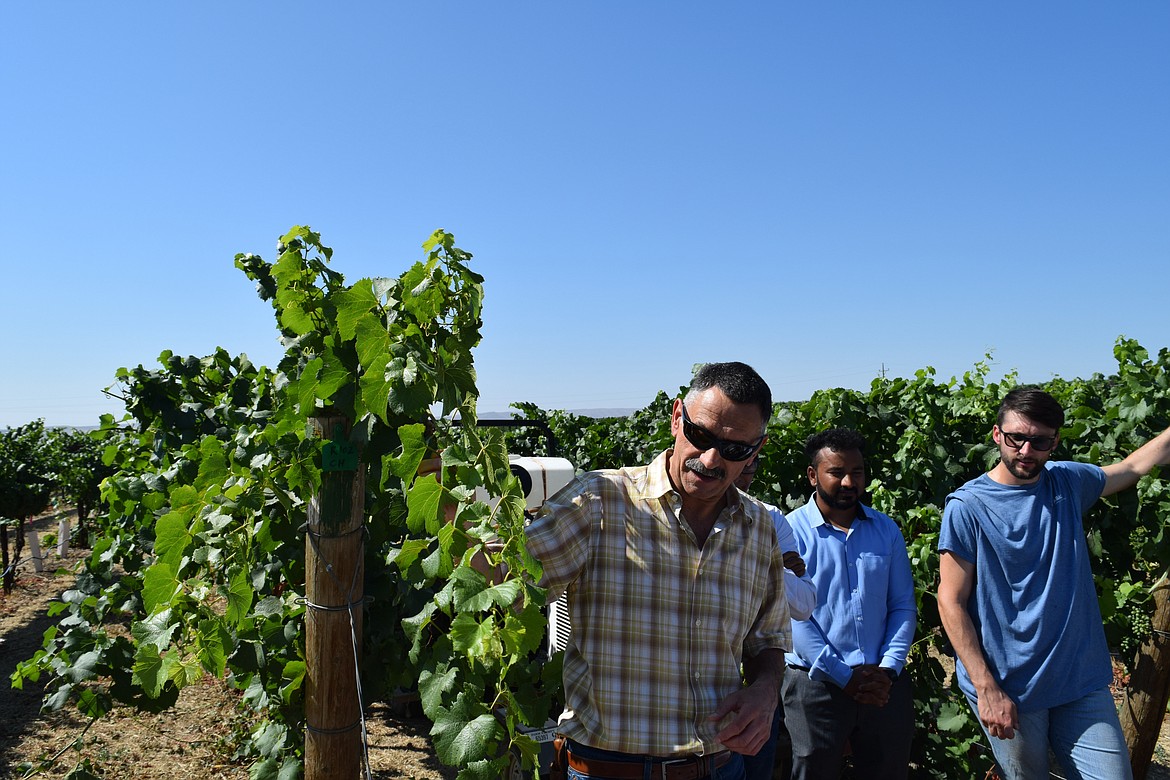WSU Prosser Extension hosts Smart Vineyard field day
PROSSER — Washington State University’s Prosser Irrigated Agriculture Research and Extension Center hosted the Smart Vineyard Field Day at WSU’s Roza Farm on July 21. The field day showcased sensors and technologies that can be implemented in a vineyard to make irrigation, cooling, and growing more effective and efficient.
Markus Keller, a professor of viticulture with WSU Prosser IAREC, presented the basics of both deficit irrigation, the main subject of the field day’s irrigation presentation, and heat stress mitigation in grapes, and how both processes are automated.
“Right now, we’re making all the decisions, right? It’s all manual,” said Keller. “So we’re lagging behind the times. This is the 21st century. We should be automating our irrigation systems, but we often don’t have the tools to do so and that’s what this project is trying to develop; an automated irrigation system that lets you go on vacation.”
Keller said that deficit irrigation is when you cut off water supply to growing grapes at the right time so that the vines and canopy stop growing and the plant is forced to focus instead on grape growth. IAREC’s network of sensors is intended to make timing decisions for irrigation like this much simpler and easier to track – and, eventually, to automate those decisions as well.
“You can see it matters what kind of wine style you are producing. It matters whether you are producing a red or a white. A big bold red or a light fruity red or so on. The variety might matter. They don’t all necessarily take the same level of water stress to be happy. So when you deficit irrigate, it’s always a bit of a gamble. It’s a line that you’re walking and you’re not knowing exactly where to go. And that means we have to measure some things.”
Another process that IAREC has automated is cooling grapes and preventing them from burning during high temperatures. Keller said that, especially in a time of increased heat waves, if humans are feeling the heat, the grapes are feeling it even more, because although the plant leaves have natural cooling processes, the berries do not.
“These grapes, now that they’re hit by direct sunlight, they will heat up way above the ambient temperature. Actually, they can heat up by about 25 to 30 degrees above ambient. So if we’re sitting at 100 degrees today, these berries can get up to 130, and that is too hot for berries. We’re trying to figure out ways to cool them down.”
The automated Fixed Spray System is IAREC’s solution to this problem, according to an informational packet distributed at the field day. The packet states that the system uses the vineyard’s network of sensors to monitor the grapes’ temperature and then uses evaporative cooling when the grapes need it to keep them under a 95-degree temperature threshold.
Keller said that one of the challenges inherent in an automated sensor and irrigation system is the cost – many of the sensor manufacturers use a subscription plan for software that requires regular payments for access, and those sensors also vary greatly in price. Keller said that the other challenge is the fact that many of the sensors don’t communicate with each other or exist on any sort of shared platform for data collection.
Jake Schrader, one of the other presenters at the field day, said that WSU is working to produce software that collects data from sensors of different manufacturers and proprietary software ecosystems in the vineyard and compiles them into one wireless data collection program. According to the informational packet, this cloud connectivity software is called LoRaWAN, and it provides wide coverage, integrated sensors, optimized power consumption, and is both reliable and cost-effective.
“I’m going next week to the Swiss Alps to hike,” said Keller. “I’m trusting these guys that the system will just run automatically while I’m gone and I have nothing to do with it. And that’s what I would like you to be able to do as well, just in the middle of the summer disappear to the jungle in Amazonia, or somewhere, and your vineyard irrigates itself…so the fully automated vineyard is what we’re moving toward.”
Gabriel Davis may be reached at [email protected].


